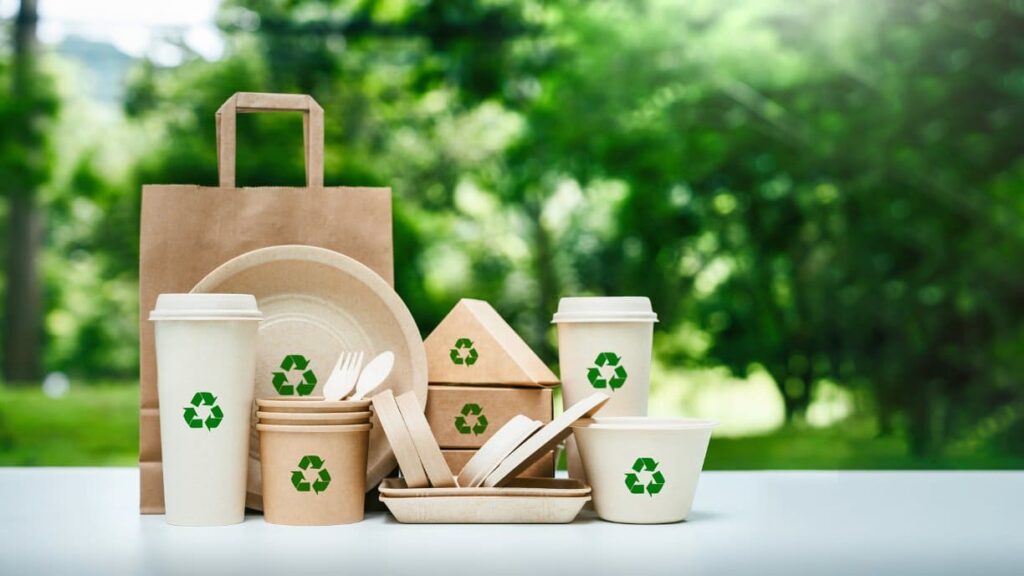The food packaging industry is undergoing a significant transformation as sustainability becomes a top priority for businesses worldwide. With growing concerns over environmental impact, companies are developing innovative and eco-friendly alternatives to traditional packaging materials. These advancements are not only revolutionizing the industry but also addressing consumer expectations for sustainable solutions.
Technological Advances in Food Packaging
Technology is playing a crucial role in the evolution of food packaging. Retailers and manufacturers are constantly seeking new ways to enhance sustainability while maintaining product integrity. In the UK, major supermarket chains such as Tesco, Ocado, and Morrisons are leading the way by replacing traditional barcodes with QR codes on milk cartons. This transition aims to enhance data storage capacity, facilitate better recycling practices, and contribute to corporate sustainability goals.
In addition to digital advancements, material innovation is also transforming packaging methods. A Finnish company has introduced an origami-inspired technology that enables the shaping of cardboard into protective structures, offering a viable alternative to plastic-based packaging. These creative solutions highlight the industry’s commitment to finding new ways to improve packaging efficiency and sustainability.
SupplyOne’s Dairy Packaging Innovations
SupplyOne Inc., a leader in customized food packaging solutions, is making significant strides in dairy product packaging. The company specializes in manufacturing high-performance, customizable packaging that enhances freshness, extends shelf life, and optimizes storage and transportation.
Understanding the need for superior barrier protection, SupplyOne offers an array of tailored solutions, including custom trays, containers, innovative films, bags, and pouches. Their expert team collaborates closely with clients to ensure each packaging solution meets specific production and storage requirements, guaranteeing efficiency and high product standards.
Sustainability remains at the forefront of SupplyOne’s mission. The company provides eco-friendly alternatives such as recyclable films and sustainable tray options, enabling dairy producers to align their packaging strategies with environmental goals. Additionally, SupplyOne’s Packaging Management Program (PMP) and Management Services Agreement (MSA) are designed to help producers cut costs, improve cash flow, and enhance operational efficiencies, further demonstrating their commitment to sustainability.
Earth Brands’ Partnership with Barclays Center
Earth Brands, a company dedicated to eliminating single-use plastics, has partnered with Barclays Center as part of the Brooklyn arena’s ongoing sustainability efforts. This collaboration is one of many emerging partnerships aimed at driving positive environmental change in the food packaging sector.
Founded in 2021, Earth Brands focuses on developing eco-friendly alternatives using PLA, a bio-based plastic derived from renewable sources. Their product range includes compostable cups, containers, and cutlery, providing sustainable solutions for consumers and businesses alike.
Catherine Carlson, Executive Vice President of Global Partnerships at BSE Global (parent company of Barclays Center), emphasized the importance of this partnership: “Partnering with Earth Brands is another step in Barclays Center’s ongoing commitment to reducing waste and expanding our sustainability efforts.” The arena has already eliminated single-use plastic straws and aims to divert more than 300 tons of waste from landfills by the end of 2024.
Peter Frelinghuysen, Co-Founder of Earth Brands, echoed this sentiment: “By making the switch to our plant-based, compostable cups and foodware, Barclays Center is helping us lead the global transition to sustainable products. Together, we are changing the game one sip at a time.”
Chadwicks’ Commitment to Sustainable Packaging
Chadwicks, a leading provider of pre-cut lids, is pushing sustainability boundaries with its rPET pre-cut lids, designed for food applications such as butter, dips, spreads, and yogurts. Made with 50% post-consumer recycled (PCR) content, these lids offer the same high-performance characteristics as virgin PET while significantly reducing carbon impact.
Paul Whelan, Chief Technical Officer at Chadwicks, stated: “We are committed to reducing our reliance on virgin plastics and embedding more responsible practices across our business. The addition of rPET lidding with 50% PCR to our product portfolio is a key milestone.”
Aluminum lids are another sustainable option provided by Chadwicks, offering excellent barrier properties against light, moisture, and oxygen. They are fully recyclable and compatible with various heat-sealing processes, making them an ideal choice for high-speed production lines and sustainable packaging solutions.
“At Chadwicks, we are on a constant journey to improve our sustainability credentials, which will also help our customers reduce their carbon footprint,” Whelan added. “Aluminum is one of the most recycled materials on earth, and we are working to incorporate higher percentages of post-consumer waste into our PET products.”
The Road Ahead: Challenges and Future Innovations
While significant progress has been made in sustainable food packaging, several challenges remain. Higher production costs, consumer education, and packaging performance issues continue to be hurdles that companies must address. However, the industry is making strides in overcoming these obstacles through collaborations, technological advancements, and ongoing research.
Companies are increasingly working together to develop more cost-effective and durable sustainable packaging solutions. By integrating innovative materials, leveraging digital technologies, and engaging in strategic partnerships, businesses can drive the shift towards a more sustainable future.
As sustainability continues to take center stage, the food packaging industry must remain proactive in adopting new solutions. By embracing change and fostering collaboration, companies can contribute to a more sustainable and environmentally conscious world.
The innovations outlined above underscore the transformative power of sustainability in food packaging. As companies push boundaries, consumers will benefit from more responsible and efficient packaging solutions, ultimately contributing to a greener planet. The journey to sustainability may present challenges, but with ongoing collaboration and innovation, the food packaging industry is well on its way to achieving lasting change.





